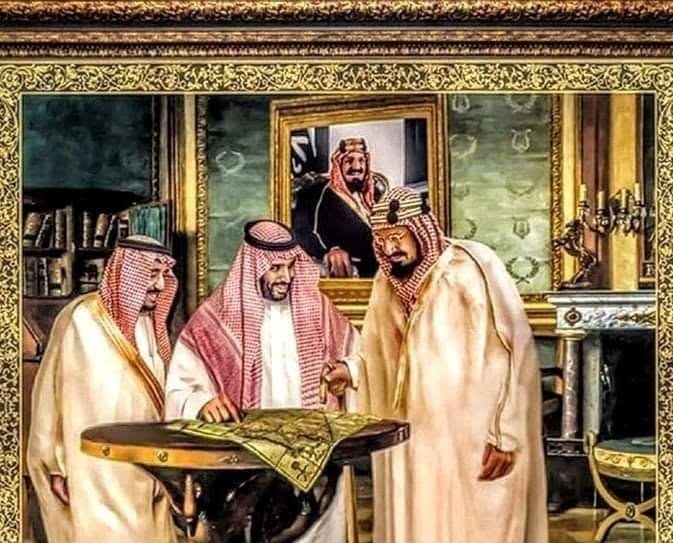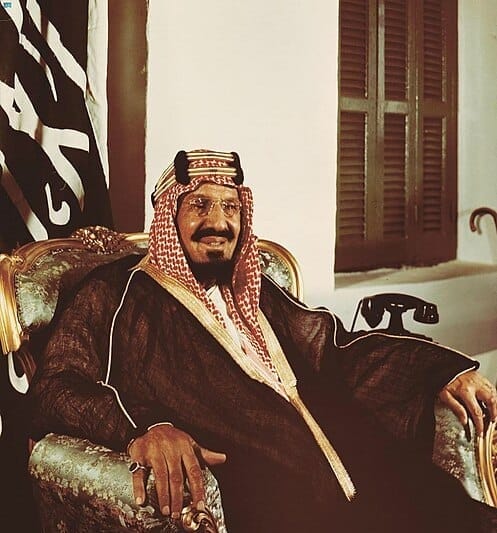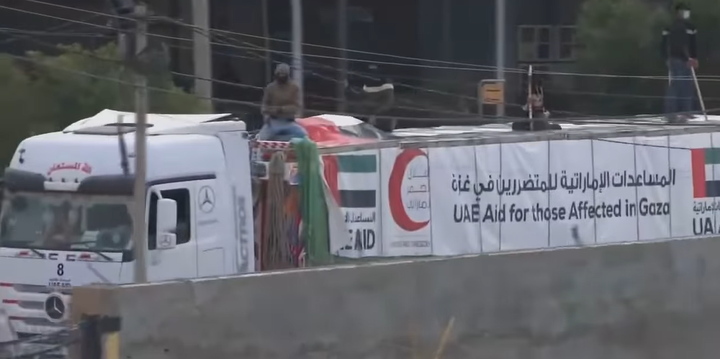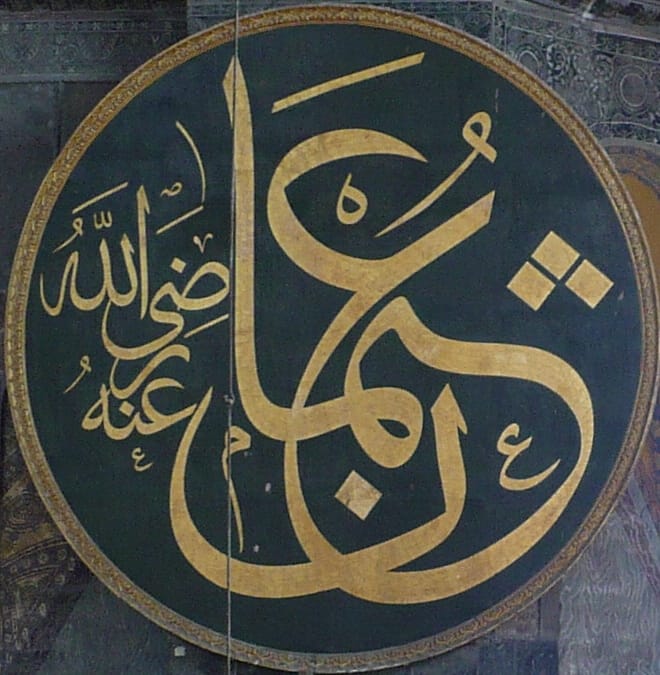Understanding Crown Prince Mohammed Bin Salman’s Vision for the Middle East & Global Prosperity

As the Gaza War continues, different views are emerging. One of the more shocking opinions tends to glorify the suppliers of rockets and arms that were used to execute the October 7 massacres. At the same time, such commentators tend to blame Saudi Arabia and other leading Gulf states for doing "nothing" to help Palestinians. This article analyzes the inherent flaws in such misguided comments and opinions. It evaluates the strategic plans of the House of Sauds to advance the Middle East, Muslims in general, and the planet as a whole.
Strategic Pragmatism of the House of Sauds
Abdulaziz Ibn Saud (1875-1953), widely known in Western parlance as “Ibn Saud” was one of the two most respected leaders, politicians, and statesmen in the Middle East during the region’s formative years of the interwar period[1]. The British, who were then leaders of the international political system (before the United States abandoned its isolationist policy), came to revere Ibn Saud because of his vision and extensive knowledge about international relations, globalization, statecraft, governance, and military tactics.
Perhaps Ibn Saud's greatest accomplishment was his ability to set limits at the perfect time. Most leaders fail because they do the wrong things at the right time and/or do the right things at the wrong time. Ibn Saud got his choices right throughout his reign, which allowed him to build a powerful state that ultimately accepted his leadership in principle and in practice.
Today, the blueprints of Ibn Saud, which his sons preserved, are being used to project geostrategic change through his grandson, Crown Prince Mohammed Bin Salman (MBS). Initially, there were questions and issues about why King Salman would delegate so much authority to his young son.
Looking at the facts closely, one can conclude that the decision was right and the best. Saudi Arabia's post-1980 generation has grown into a world that is totally different from what their parents lived in. The elements that kept Saudi Arabia together as a state in the 20th Century have changed significantly. Thus, the best way to steer the country into the present Century is to work with a young and dynamic leader who understands the motivations of Saudis of the younger generation and changes in the international and global order.
Thus, MBS is a unifier who brought together the super-experienced Arabic scholars who knew the ins and outs of the Quaran and its traditions on the one hand, and the grandchildren of such scholars who speak fluent English hold Ivy League university degrees, and are set to engage with global audiences from China to Canada. Thus, the timeless knowledge of scholarly traditional knowledge is maintained alongside the most sophisticated knowledge of emerging technologies that can be served to populations worldwide – all kept together by the statecraft of the House of Sauds. The excellence of the holy particularist traditions of Mecca and Medinah is balanced with today's best practices under the same umbrella.
Ibn Saud lived to reflect the Quranic verses that preached that change from Heaven comes when humans change on earth. Thus, the House of Sauds embraces the principle that Sunnah and its application change to correspond with the times and place. With wise counsel from Islamic scholars who represent rulings and jurisprudence that have developed over centuries, the House of Sauds is uniquely positioned to change and lead change in the Middle East, the Islamic world, and the world at large.
Leading Islam into the Global Order (Vision 2030)
While some Islamic governments might lead through strictures appropriate to their own geographic and dynamic characteristics, the considerations of the leader of the House of Sauds in each generation transcends simplistic considerations.
We live in a world of coexistence, technological feudalism, and massive globalization. This is not the time for isolationism and exclusion. It is time for pluralism and increased interaction. What is most important is to build strong inner structures to ensure every Saudi national knows who they are. This is the only way to ensure that no Saudi is "lost" in the unfolding international discourse.
On the other hand, Saudi Arabia has a lot to offer the world. It has many traditions and practices it can share with the world to advance humanity. Concerning the global Islamic population, Saudi Arabia has many treasures in religious teachings and charitable acts they can share.
Blessed with immense wealth from its petroleum exports, Saudi Arabia is in a unique position in history to lead change for Muslims and the world at large. This is at the core of Mohammed Bin Salman’s Vision 2030 strategic plan for Saudi Arabia and the other Gulf Cooperation Countries.
Some experts opined that by 2030, when these projects are completed, the Middle East will overtake matured and declining regions like Western Europe in terms of productivity and many other indices[2]. There are many reasons for this. First, they have the capital backing to fund productive ventures. Secondly, the population in the Middle East and its adjoining territories continue to grow in numbers and competencies. Thus, the region could become transformed into a center for research, innovation, and productivity. Thirdly, the geostrategic location of the Middle East and its cultural diversity means it can produce and sell to anyone on the planet through efficient distribution networks.
Based on this logic, Vision 2030 started with great momentum in the late 2010s by laying out mega infrastructural projects[3]. The next stage was to put these projects into production to create more products and attain liquidity and returns on investment. The global economic slowdown caused by the COVID-19 pandemic made this seem like an impossible dream. However, it was a blessing since local consumption and production were boosted. This met regional needs and allowed for the enhancement of internal structures and systems.
Ultimately, the goal is to create a solid geopolitical and geostrategic representation of the world’s leading Islamic country. This will make Saudi Arabia the unique light that projects the glory of the Muslim world to all nations.
A structured and strategic entry into the global order involves blending caution with efficiency. It also contributes to good faith interaction, which has long-term reputational benefits. Like the British of the 20th Century, no one can criticize Saudis around the world because they maintain high levels of dignity that enable them to command respect among Muslims and non-Muslims alike. Thus, the end game is to get Saudi Arabia to lead the Islamic world into a new global order in ways that are free of preconceptions and other stereotypes that abound in many parts of the world.

MBS makes the Saudi shemagh approachable and respectable. He represents a universalist embodiment of this generation's realities. At the same time, the level of dignity and self-respect MBS and his generation of Saudi rulers command make them highly dignified and reliable national emissaries.
Investing in the Dignity of Work
Saudi Arabia is wealthy. The Kingdom can invest in businesses and ventures around the world and make unlimited revenues to pay every citizen a decent salary. In return, Saudis can have the most luxurious life imaginable and do nothing.
However, there is dignity in work. Individuals gain a level of self-satisfaction when they complete their work tasks. Many studies have shown that pensioners and workers who become disabled get depressed, and this leads to health complications that often shorten their lives[4][5]. Thus, MBS has encouraged work and production. This is the best way to get Saudis to produce and build a connection with the works of their hands.
To achieve the goals of productivity among the Saudi population, many strategic units have been created under MBS’s watch. Ministries and units of government have been made more functional to encourage productivity. Through productivity, individuals can create things for themselves, learn, and achieve tangible results that will contribute to the world long after they leave this world.
The impact of encouraging the dignity of work among Saudis will spread to future generations. Also, gender restrictions on populations are gradually eased but under the close eye of the religious elite. After all, a country with an active and productive female population will get twice the benefits of labor and many more benefits in the qualitative enhancement of its systems and structures.
Another opportunity to encourage women to work and generate value is for Saudi Arabia to lead by example and operationalize its traditions to create virtuous family bonds that can thrive even if the couple go out to work. This will be exemplary and set the tone for gradual change around the world. After all, the regimes that insist on women staying at home cannot (or are not in a position to) force other Muslim countries to emulate them. These same regimes of leading Islamic countries with rigid interpretations of gender apartheid cannot do much to change Islamic communities around the world that have adopted European and other foreign traits. All they can do is fund radical groups to condemn the masses and, in many cases, lead armed struggle that will destabilize these countries.
Saudi Arabia, under King Salman and the premiership of the Crown Prince, is taking a different path. They are developing gender-based socioeconomic dynamics in the homeland of Islam. Their success will lay the blueprint for women’s empowerment in Islamic countries around the world, which balances the needs of marriage, child care, and family values.
Unearthing Talents and Giving them a Distinct Label
Islam has an extensive body of knowledge that has evolved over the centuries. Virtually everything that could potentially be invented in the future has been covered by Islamic scholars in past times. While this is good, it also lends itself to many possible interpretations that can sow divisions.
In our generation, when the world is at a turning point, rules and objective parameters are needed for new sectors and activities to evolve. Things like fashion, sports, and business have evolved significantly after years of being considered inherently non-Islamic. MBS has unique leverage to broker these discussions and catalyze the implementation of practical and acceptable solutions.
Talents are assigned to people in ways we can never understand. Many will sacrifice their inner abilities and essence in a system where blanket bans are imposed on things at which they might be gifted. As such, it is necessary to create a mechanism to nurture talents and abilities in a supervised manner.
Saudi fashion, which drives family values in Saudi Arabia and the Islamic world at large, cannot be wrong. However, there are people from extremist regimes who will place blanket bans on fashion. At this unique point, under the leadership of a dynamic person like MBS, balanced by King Salman, an ongoing debate can evolve healthily to improve things. This will ultimately put Saudi Arabia in the legitimate leadership role of the Islamic world and global order.
Enriching the Global Discourse
Globalization is in motion and set to expand. As such, the Islamic and Arabian presence must be represented in the most efficient manner. This puts Saudi Arabia under MBS in a distinct position.
Saudi Arabia and the GCC can continue to invest around the world to cement their leadership in the global economy. However, influence comes through soft and hard power. This requires continuous and active engagement. Hence, this is not a time for isolationism, otherization, or military adventurism. It is a time for engagement and credible involvement in the global order.
Saudis have reputational leverage, which can be used to dig deeper into other regions of the world through the enhancement of Saudi soft power. Thus, Saudi Arabia can enrich friendly ventures and activities to make itself and the region attractive to the world. This will uplift and inspire others to follow suit.
Essence of Peace & Coexistence
War will inevitably set all the good intentions of Saudi Arabia and the GCC back significantly. Without security, all the developmental activities and processes will face setbacks. Wealth to be used to develop civilian production, assets, and businesses will have to be spent destroying an enemy—real or imagined. Therefore, lasting peace and security guarantees are necessary.
Saudi Arabia has chosen a path of coexistence.
They have urged their allies to do the same. However, some do not see it that way. The path to peace and coexistence is not easy. It requires discipline, hard work, and accountability.
Under MBS, Saudi Arabia has demanded accountability from some of its associates and fragile regions of the Middle East – including the Palestinian people. This cast him as unpopular in the short run. However, he was proven right.
Saudi Arabia has demanded accountability from the Palestinian Authority to end or reduce corruption. Some bystanders have cast this as being harsh on Palestinians. However, a Palestinian state cannot be established if they do not have functional state institutions.
Conversely, if the international community secures the conditions for a Palestinian state, accountability and responsibility will be necessary to keep the state going. Thus, such demands might sound harsh on the surface. However, over time, their correctness becomes established.
On the other hand, there are some regimes in the region that profit from stoking violence without demanding accountability in any form. These regimes tend to benefit from war between Israel and the Palestinians.
Populism from pro-violence regimes in the Middle East tends to turn the tide on MBS and the House of Sauds. This is done by asserting that they are not “helping” the Palestinians sufficiently. However, the truth is that while these regimes provide militant Palestinian groups and regional groups with rockets to provoke war with Israel, Saudi Arabia under MBS and the GCC states are often the quickest to provide aid to suffering Palestinians or civilians in these wars.
Conclusion
Truth stands.
Standing for the truth is not a wasted life. Thus, the balance of governance between King Salman and his son, MBS, brings balance between the timeless gifts of the Saudi people and the unpredictable future. What is apparent is that we are at a watershed moment, and Saudi Arabia’s only option is to lead. This leadership has to go beyond superficial and responsive acts driven by populism. Instead, it is premised on long-term needs that MBS has led through strategic planning, promoting productivity and the dignity of work, and testing and developing standards that will drive the world of Islam into the future. Peace and coexistence are necessary on this path. Populism from hostile states should be actively challenged and limited, while victimized groups must be encouraged to embrace accountability and efficiency.
[1] Malik Dahlan. The Hijaz: The First Islamic State. Oxford: Oxford University Press, 2019
[2] Fareed Zakaria. “The rise of the Persian Gulf is reshaping the world" New York Times. Published: June 16, 2023. Available at: https://www.washingtonpost.com/opinions/2023/06/16/saudi-arabia-gulf-reshaping-world/
[3] Frederic G. Schneider. "The Stalling Visions of the Gulf: The Case of Saudi Arabia’s Vision 2030" The Washington Institute. Published: May 14, 2021. Available at: https://www.washingtoninstitute.org/policy-analysis/stalling-visions-gulf-case-saudi-arabias-vision-2030
[4] David Fone, Frank Dunstan, Gareth Williams, Keith Lloyd & Stephen Palmer. "Places, people and mental health: A multilevel analysis of economic inactivity" Social Science & Medicine 64 (3) 2007 pp633-645
[5] Stanley Parker. Work and Retirement. (London: Routledge, 2022) p62




